Top 5 Privacy Coins: Features and Differences
Cryptocurrencies that focus on the privacy of their users – or, simply, privacy coins – have drawn the interest of many different people, all with a single priority: nobody should know how they spend their money. Bitcoin may not be as anonymous as most people think, but there is a number of coins focusing on that issue first and foremost. Oftentimes, privacy coins are considered the ones that truly follow original Bitcoin ideas about anonymity and decentralization.

However, not all of them are decentralized or even completely anonymous. They all have their strengths and weaknesses, and figuring out exactly what you need – and how they fit into that – is your first step towards finding the coin you want. Here, we will take a quick look through the top five privacy coins by market capitalization, their attributes and points of interest.
You may want to note that “cryptographically private” means that the ways of maintaining privacy have been built into the product by ways of cryptography. This makes it impossible for someone to track your transactions as there is no way for them to know that it is your transaction to begin with – an important point to consider when choosing a privacy coin.
Top 5 Privacy Coins
Monero (XMR)
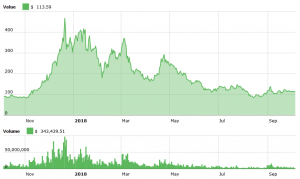
Market Cap: USD 1.9 billion (October 4)
Rank: 10th (by market capitalization)
Privacy: cryptographically private
Decentralization: decentralized
Overview: Considered the most secure and anonymous privacy coin in the market today, Monero enables users to hide the amount of digital cash they send and receive, the source of the funds, the recipients, and the amounts held in their wallets. It is cryptographically private by default, utilizing several privacy features – most prominently being stealth addresses and ring confidential transactions (RingCT).
Points of Interest: Mining centralization is a possible weakness; the coin’s popularity on the dark web gives it a bad reputation; a possible plus is that the coin has a dedicated hardware wallet.
Dash (DASH)
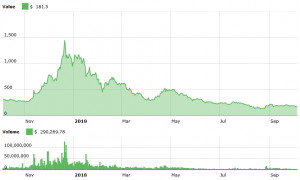
Market Cap: USD 1.5 billion
Rank: 12th
Privacy: not cryptographically private; privacy through mixing
Decentralization: partially centralized
Overview: Dash promises privacy through mixing, utilizing a modified version of CoinJoin – a method initially created to “anonymize” Bitcoins. Dash functions similar to Bitcoin, in that the blockchain is transparent by default while offering optional privacy by way of mixing. A masternode is required to expedite the mixing process, which in turn requires users to trust that the server is not recording details on where each user’s outputs are ending up.
Points of Interest: Masternode network makes it semi-centralized but allows it to include innovations like InstantSend, PrivateSend, and the Dash Budget System; not completely trustless as there is nothing keeping the masternodes from recording details; takes seconds to confirm a transaction.
Zcash (ZEC)
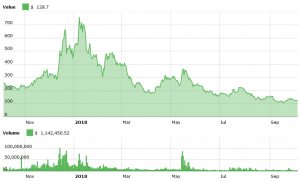
Market Cap: USD 645 million
Rank: 21st
Privacy: cryptographically private; but not private by default (meaning you have to turn privacy ON, otherwise the transaction is public)
Decentralization: partially centralized
Overview: Zcash leverages the Zerocoin protocol and zero-knowledge proof cryptography called zk-SNARKs to provide financial privacy to its users by enabling them to hide information about the sender, the recipient, and the transaction amount. At the basic level, zero-knowledge proofs allow to prove that the information you are sending to the other party is true, without having to broadcast said information besides the fact that it is true.
Points of Interest: Creating a shielded transaction is computationally heavy (although an upcoming hard fork promises to solve this issue almost completely); unshielded transactions can, in some cases, leak information about shielded transactions.
Verge (XVG)
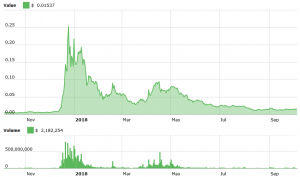
Market Cap: USD 232 million
Rank: 40th
Privacy: not cryptographically private; privacy through Tor browser, used by many to protect their online identity, and I2P routing
Decentralization: decentralized
Overview: Verge only offers “privacy” by way of Tor and I2P routing, to obfuscate traffic and conceal a user’s IP address when transacting. There are no cryptographic privacy features with regards to the blockchain, the linkability and traceability of transactions and addresses, nor the concealment of the amounts being transacted. The coin also lost its credibility in early 2018 after experiencing two 51% attacks.
Points of Interest: the 51% attacks are considered a big drawback in security; there have been network promises and underdeliveries by the team that were considered unprofessional.
Komodo (KMD)
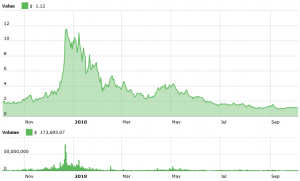
Market Cap: USD 124 million
Rank: 52nd
Privacy: cryptographically private; but not private by default
Decentralization: partially centralized
Overview: Komodo uses zero knowledge proofs to provide its users with financial anonymity. Aside from offering increased financial privacy through its digital currency KMD, the Komodo platform also offers the launch of decentralized ICOs (dICOs), a decentralized exchange, and blockchain development solutions, among other services.
Points of Interest: Scalability solution called Peerchains, where sibling chains (different assetchains) on the KMD platform can form a network of blockchains which operates on its own and doesn’t bloat the Komodo blockchain; interoperability between different blockchains; passive income, where holding your tokens in a KMD wallet generates you 5% KMD annually by just sending your coins back to your address; however, the community is quite inactive.




